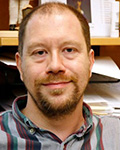Virtual Tissue Computer Simulation of Development, Homeostasis and Disease using CompuCell3D
Category
Published on
Bio
 Dr. Glazier’s research focuses on early embryonic development, developmental and chronic toxicity and developmental diseases, with more than 70 experimental and computational papers on biological development and developmental diseases (including polycystic kidney disease (ADPKD), tumor growth and vascularization, Age Related Macular Degeneration and diabetic retinopathies, somitogenesis and liver toxicity). He leads the collaborative development of the open-source CompuCell3D multi-scale modeling and model-sharing environment and works closely with the EPA, which has adopted CompuCell3D as a core platform for their CompTox computational toxicology program. He actively disseminates both methods and models, with more than 200 invited talks and seminars on modeling and CompuCell3D. He also maintains an experimental effort in microfluidics and optical biochemical microsensors. He has expertise supervising collaborative development of models and in developing workflows integrating models with experimental data, most recently in the area of developmental toxicology. In 2016, he became one of the founding members of Indiana University’s Department of Intelligent Systems Engineering (the first engineering program at Indiana University, Bloomington), which aims to apply advanced computing techniques to understand and control complex natural and engineered emergent systems. Within ISE, he leads the creation of the Bioengineering track, with 8 faculty hires in 2016 and 2017 and novel transdisciplinary BS, MS and PhD syllabi. As founding director of the Biocomplexity Institute at Indiana University, he has extensive experience in model sharing, having led the MSM model sharing Working Group for 2 years and participated extensively in developing multi-cell model specification standards. He was instrumental in more than 10 interdisciplinary biosciences faculty hires at Indiana University in the Departments of Physics and Biology and the School of Informatics. He also led the creation of a new Biological Physics PhD track with an interdisciplinary syllabus and qualifying examination. He has experience organizing large-scale multidisciplinary biomedical research projects and has organized 11 international workshops on Biocomplexity and numerous symposia and panels at major international meetings as well as 11 CompuCell3D User-training workshops and five workshops on model sharing and standards. He has supervised 14 students who have completed PhD dissertations, 21 postdoctoral researchers and 33 high-school and undergraduate researchers.
Dr. Glazier’s research focuses on early embryonic development, developmental and chronic toxicity and developmental diseases, with more than 70 experimental and computational papers on biological development and developmental diseases (including polycystic kidney disease (ADPKD), tumor growth and vascularization, Age Related Macular Degeneration and diabetic retinopathies, somitogenesis and liver toxicity). He leads the collaborative development of the open-source CompuCell3D multi-scale modeling and model-sharing environment and works closely with the EPA, which has adopted CompuCell3D as a core platform for their CompTox computational toxicology program. He actively disseminates both methods and models, with more than 200 invited talks and seminars on modeling and CompuCell3D. He also maintains an experimental effort in microfluidics and optical biochemical microsensors. He has expertise supervising collaborative development of models and in developing workflows integrating models with experimental data, most recently in the area of developmental toxicology. In 2016, he became one of the founding members of Indiana University’s Department of Intelligent Systems Engineering (the first engineering program at Indiana University, Bloomington), which aims to apply advanced computing techniques to understand and control complex natural and engineered emergent systems. Within ISE, he leads the creation of the Bioengineering track, with 8 faculty hires in 2016 and 2017 and novel transdisciplinary BS, MS and PhD syllabi. As founding director of the Biocomplexity Institute at Indiana University, he has extensive experience in model sharing, having led the MSM model sharing Working Group for 2 years and participated extensively in developing multi-cell model specification standards. He was instrumental in more than 10 interdisciplinary biosciences faculty hires at Indiana University in the Departments of Physics and Biology and the School of Informatics. He also led the creation of a new Biological Physics PhD track with an interdisciplinary syllabus and qualifying examination. He has experience organizing large-scale multidisciplinary biomedical research projects and has organized 11 international workshops on Biocomplexity and numerous symposia and panels at major international meetings as well as 11 CompuCell3D User-training workshops and five workshops on model sharing and standards. He has supervised 14 students who have completed PhD dissertations, 21 postdoctoral researchers and 33 high-school and undergraduate researchers.
 Trinity Chung is a data science major at Pasadena City College. She is collaborating with the Biocomplexity Institute at Indiana University aiding the development of cell simulation software. Trinity hopes to pursue a career in biotechnology or space exploration.
Trinity Chung is a data science major at Pasadena City College. She is collaborating with the Biocomplexity Institute at Indiana University aiding the development of cell simulation software. Trinity hopes to pursue a career in biotechnology or space exploration.
Sponsored by
Cite this work
Researchers should cite this work as follows: